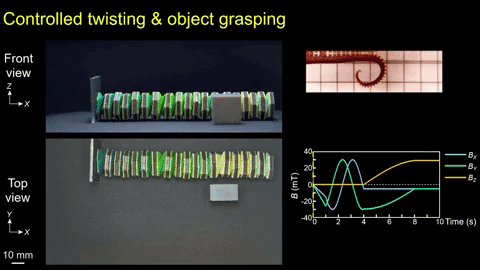Creativity Faucet, Hungry Island, Iron Lungs, and Xerox Landscapes
#18 of 10+1 Things
Welcome to #18 of 10+1 Things!
Thanks to everyone who bought me coffee last week. Your support keeps this newsletter up and running.
Here are 10+1 Things that I thought were worth sharing this week:
💡 Creativity Faucet
Julian has written an interesting article on how to generate ideas using an approach called, 'Creativity Faucet'. He compares the creative process of generating ideas to that of a backed-up pipe of water. To get clear water, the wastewater first needs to be emptied out. Similarly, at the beginning of any creative endeavour, bad ideas reflexively come to our minds. Instead of being self-critical, these bad ideas need to be accepted. Once these bad ideas run out, new ideas begin to appear. The problem is that most creators never get past the bad ideas and they resist these ideas too much.
[Read more on Creativity Faucet]
🌐 The Web Experience
How-i-experience-web-today.com is an interesting website that brilliantly demonstrates how today web is such a mess and how frustrating can it be for users. The website has every single annoying feature of modern websites like pop-ups for cookies, turn on notification reminders, subscribe forms, chat options and paywalls. The attention to detail on this website is astonishing and captures everything that annoys me!
[Check out How I experience web today]
What is one thing that annoys you while trying to read articles?
For me, it's paywalls and it is one of the main reasons why I have abandoned Medium completely!
🍖 Lab-Grown Future
Lab-grown meat is nothing new but Newatlas in an interesting article explores the vast variety of lab-grown items we are trying to replicate and manufacture. Lab-growing is the process of creating materials that have the same cellular structure as the naturally occurring material. This is achieved by mimicking the natural formation process within a shorter time span in a lab environment. Various research organisations and companies around the world are trying to lab-grown meat, dairy products, diamonds, wood, blood, organs and even cars!
[Read more on Lab-Grown Future]
🏝 Hungry Island
Madagascar, the second largest island nation in the world is currently suffering from a famine caused by climate change, not conflict. Due to the rising temperatures, the country is now going through its worst famine in 40 years. The twist here is that Madagascar produces only a little more than 0.01% of the world’s annual carbon dioxide emissions every year yet facing one of the worst implications of climate change on the planet. According to United Nations, at least 1.1 million people are in some kind of severe food insecurity. Crops have failed and people are relying on insects, cactus leaves and even clay mixed with tamarind for food.
[Read more about the famine in Madagascar]
"This is unprecedented. These people have done nothing to contribute to climate change. They don't burn fossil fuels… and yet they are bearing the brunt of climate change" ~ Shelley Thakral, WFP
🐙 Origami Robot
Inspired by Octopus tentacles, researchers from Stanford University have created an origami, bio-inspired robot arm that can twist, bend, reach, grab and bring back objects. Unlike other robots which have motors, the robot is powered by a magnetic field. The segments are designed similar in a Kresling Origami pattern, which enables the robotic arm to extend into a tube or shrink into a compressed form. The robot in the future can be integrated into multiple biomedical applications especially in invasive procedures.
[Read more about the Origami Robot]
🤠 How to Gain Confidence
Tiny Wisdom has written a small blog post on the feeling of inferiority and how to gain confidence. Inferiority arises when someone is better than us and we lose confidence. The first step towards gaining self-confidence is the shift of mindset where all negativity has to be avoided and the brighter side of things needs to be focused on. Talking about your inferiority, avoiding negative triggers like social media and starting to love yourself is the way to gain true self-confidence.
[Read more on How to Gain Confidence]
🎬 Iron Lungs
I've been inspired by watching a video of Paul Alexander, one of the last few remaining polio survivors that depend on iron lungs, a half-century-old mechanical ventilator that forces patients to breathe. Alexander got polio in 1952 at the age of 6 and is paralyzed below the neck. Despite his difficulties, Alexander went to college, studied law and was a trial lawyer. The video explores the inspiring story of Alexander and his difficulties growing up, his education, how he found a mechanic for repairing his iron lung and his routines.
[Watch the Video]
When we complain about our simple problems, here's a man confined in an iron box paralyzed trying to tell the world his story with a pen attached to a plastic spoon in his mouth!
🧵 First Principles
I've been exploring the concept of First Principles Thinking and found this interesting thread by Sahil Bloom distilling the concept into simple tweets. In a nutshell, it is a problem-solving technique that requires you to break down a complex problem into its most basic foundational elements. The thread explores the concept and explains it with the example of How Elon Musk uses the first principle thinking on solving the complex problem of sending a rocket to marks (Reach Mars- need a rocket - rockets are expensive- alloys are cheap - build a cheap rocket first!).
[Check out the thread]
🖨 Xerox Machine Landscapes
This week I'm exploring an artwork called 'My Travels through the World on my Copy Machine' by an artist called Dominique Teufen. Instead of ink or paint, Teufen uses a photocopier to capture majestic scenery with the help of food packaging, plastic wraps and fabric wraps. She loads her copier with an A3 paper and experiments with various objects and the copier lid to obtain the desired output she looks for. From mountain views to coastline, the final images give us an impression of a rugged landscape often seen on a magazine or a book, but are artificial scenery created using a simple copier!
[Check out the photos]
"When people look at these landscapes, they think they're photographed. I like to confuse people's understanding of what's real and what's not."
📚 Theoretical Minimum
I've just finished Art of Noticing and have started a new book called The Theoretical Minimum: What You Need to Know to Start Doing Physics. This is a book for anyone who has ever regretted not taking physics in college—or who simply wants to know how to think like a physicist. Written by physicist Leonard Susskind and citizen-scientist George Hrabovsky, the book provides a tool kit for amateur scientists to learn physics at their own pace.
[Check out the book on Amazon]
If you're someone who likes Physics, this is a must-read! I'm planning to read this one slowly by taking notes for over a month!
🎧 What I'm Listening to
I'm addicted to post-rock music lately and have enjoyed this collection titled 5 Songs That'll Make You Fall in Love With Post-Rock by World has Post Rock.
[Listen to the collection]
Loved this comment on the video:
This is the type of music you listen to while staring out to the universe, and the stars and the moon. Realizing how little we are.
What kind of music do you enjoy?
📣 Land of Random
If you love 10+1 Things, I'm sure you would love Land of Random. Land of Random is a curated newsletter similar to this newsletter that explores cool new technology, marketing, AI, entrepreneurial ideas, and other random internet stuff in bite-sized bytes every week. I'm in love with the newsletter and would definitely recommend you to give it a try!
[Check out Land of Random]
That’s 10+1 Things for the week.
This newsletter is free, but not cheap. It takes a lot of effort and time from my end (7~8 hours) to deliver this newsletter every week. You can help me in keeping it going by forwarding it to someone you like, leaving a testimonial, buying me a coffee ($1 or ₹75), sending me some crypto, visiting my blog or following me on Twitter.
See you next week!
With Love,
Rishi
Quote of the Week
“Are you willing to sprint when the distance is unknown?” — Lewis Caralla







